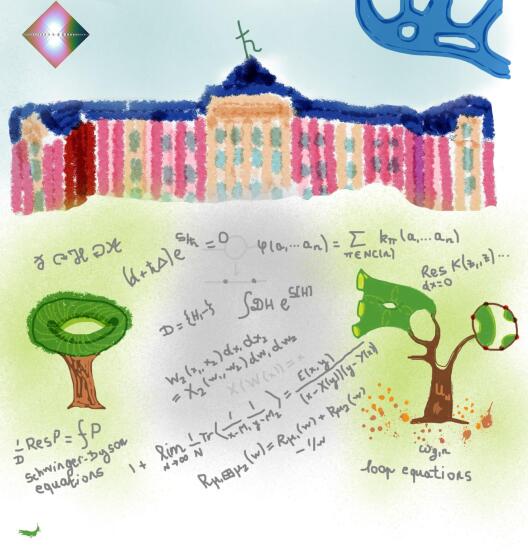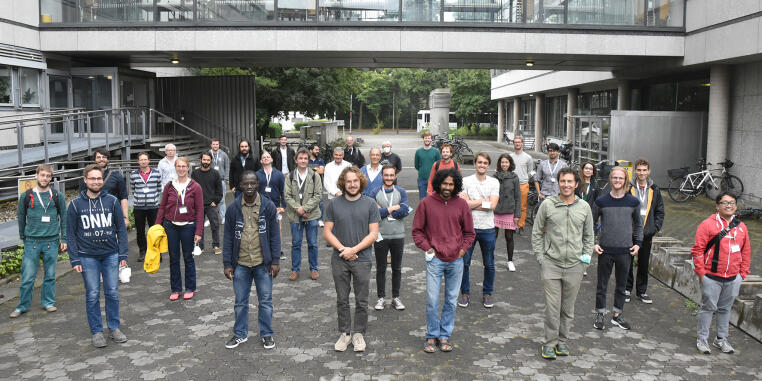
Noncommutative geometry meets topological recursion
We plan to run the workshop in hybrid form with a considerable number of participants present in Münster and video transmission to the outside world.
This workshop intends to be a first meeting point for specialists and young researchers active in noncommutative geometry, free probability, and topological recursion. In the two first areas, one often wants to compute expectation values of a large class of noncommutative observables in random ensembles of (several) matrices of size N, in the large N limit. The motivations come from the study of various models of 2d quantum gravity via random spectral triples, or from the problem of identifying interesting factors via approximations by matrix models. Topological recursion and its generalisations provide a priori universal recipes to make and to compactly organise such computations, not only for the leading order in N, but also to all orders of expansion in 1/N. In this way connections are established to domains like enumerative geometry, tropical geometry, mirror symmetry, topological and more generally low-dimensional quantum field theories where topological recursion has also been applied.
Concretely, the last 10 years have witnessed the developement
- of analytic techniques to establish the existence of large-N asymptotic expansions,
- of applications of the topological recursion to a growing class of matrix models which now include some of direct interest in the study of random spectral triples and in noncommutative probability,
- and of connections between the combinatorics of free probability (i.e. higher order free cumulants) and the topological recursion together with symplectic transformations acting on it.
The workshop will explore the consequences of these remarkable algebraic structures axiomatised in topological recursion for problems in noncommutative geometry and free probability. Knowledge will also flow in the other direction, as the very nature of topological recursion hints at connections to (noncommutative) algebraic geometry and to Hopf algebraic structures and Connes-Kreimer renormalisation.
Mathematical models and phenomena under consideration are common to all these fields, and we wish to unite the strength of probabilistic/asymptotic, algebraic/geometric and combinatorial approaches for the benefit of all the communities involved. This interaction should in fine lead to a better geometric understanding, more powerful computational tools, and new results.
Minicourses
Introduction to topological recursion
Elba Garcia-Failde (IRIF, Université Paris Diderot)
Noncommutative geometry and spectral triples
Walter van Suijlekom (IMAPP, Radboud University Nijmegen)
Free probability and higher order freeness
Roland Speicher (Fachrichtung Mathematik, Universität des Saarlandes)
(Mixed) topological recursion and the two-matrix model
Bertrand Eynard (Institut de Physique Théorique, Paris-Saclay / IHÉS)
Organisers
Gaëtan Borot (Institut für Mathematik & Institut für Physik, Humboldt-Universität zu Berlin)
Masoud Khalkhali (Department of Mathematics, University of Western Ontario)
Hannah Markwig (Fachbereich Mathematik, Eberhard Karls Universität Tübingen)
Jörg Schürmann (Mathematisches Institut, WWU Münster)
Raimar Wulkenhaar (Mathematisches Institut, WWU Münster)
Participants
Adam Afandi (Münster), Nezhla Aghaei (Odense), Alexander Alexandrov* (Pohang), Jørgen Ellegaard Andersen (Odense), Julio Narciso Argota Quiroz* (London), Francesca Arici* (Leiden), Octavio Arizmendi Echegaray (Guanajuato), Remi Cocou Avohou (Berlin), Shahab Azarfar* (Western Ontario), Valentin Baillard (Paris-Saclay), Keshab Bakshi* (Chennai), Noe Barcenas* (Morelia), Babak Beheshti* (Western Ontario), Marco Bertola* (Concordia, Montréal), Gaëtan Borot (Berlin), Nicholas Boschert* (Los Angeles), Jan Boschheidgen (Madrid), Johannes Branahl (Münster), Carlson Büth (Münster), Renzo Cavalieri (Colorado), Adrian Celestino (Trondheim), Severin Charbonnier (École Polytechnique), Nitin Chidambaran (Bonn), Stéphane Dartois* (Bordeaux), Tim de Laat* (Münster), Harini Desiraju* (Birmingham), Rui Dong* (Nijmegen), Kurusch Ebrahimi-Fard (Trondheim), Bertrand Eynard* (Paris-Saclay), Veronica Fantini* (IHÉS), David Fernandez* (Bielefeld), Jeremy Gamble* (Western Ontario), Elba Garcia-Failde (Paris), Eusebio Gardella* (Münster), Alessandro Giacchetto (Bonn), Nicholas Gilliers (Greifswald), Lisa Glaser (Wien), Christian Gorzel (Münster), Harald Grosse* (Wien), Marvin Anas Hahn (Leipzig), Katharina Harengel* (Münster), Lucien Hennecart* (Paris-Saclay), Hamed Hessam* (Western Ontario), Lutz Hille (Münster), Alexander Hock (Münster), Mikhail Isachenkov* (Amsterdam), Roberta Anna Iseppi (Odense), Jonas Karlsson*, David Kerr (Münster), Masoud Khalkhali* (Western Ontario), Finn Bjarne Kohl (Münster), Thomas Krajewski (Marseille), Reinier Kramer (Bonn), Dirk Kreimer* (Berlin), Giovanni Landi* (Trieste), Helder Larraguivel* (Warszawa), Felix Leid* (Saarbrücken), Danilo Lewanski (IHÉS), Bing-Sheng Lin* (South China), Jakob Lindner (Münster), Jonas Lübken (Münster), Christopher Mahadeo* (Sasketchewan), Camille Male* (Bordeaux), Olivier Marchal* (Lyon), Hannah Markwig (Tübingen), Tomasz Maszczyk* (Warszawa), Grigory Mikhalkin* (Genève), James Mingo* (Kingston), Chiranjib Mukherjee (Münster), Victor Nador (Bordeaux), Jonathan Novak* (San Diego), Nathan Pagliaroli* (Western Ontario), Frédéric Patras (Nice), Carlos Pérez Sánchez (Warszawa), Dragan Prekrat* (Belgrade), Irene Ren (IHÉS), Vincent Rivasseau (Orsay), Jörg Schürmann (Münster), Marcello Seri* (Groningen), Sergey Shadrin (Amsterdam), Piotr Śniady (Warszawa), Yan Soibelman* (Kansas), Roland Speicher (Saarbrücken), Piotr Sułkowski* (Warszawa), Frank Taipe* (Orsay), Pedro Tamaroff* (Leipzig), Juraj Tekel* (Bratislava), Johannes Thürigen* (Münster), Ran Tessler* (Weizmann Inst), Hannes Thiel (Dresden), Elad Tzalic* (Weizmann Inst.), Giacomo Umer (Berlin), Teun van Nuland* (Nijmegen), Walter van Suijlekom* (Nijmegen), Zhituo Wang* (Harbin), Adam Wegert* (Kraków), Zhaoting Wei* (Texas A&M), Wend Werner (Münster), Raimar Wulkenhaar (Münster), Karen Yeats* (Waterloo)
(Updated 12 August) (*remotely)

Schedule
Here is a booklet which contains schedule, abstracts and information for participants. Here is a Tentative schedule and abstracts (much smaller file size)
| Monday 16 | Tuesday 17 | Wednesday 18 | Thursday 19 | Friday 20 | |
| 9.00-10.00 | Elba Garcia-Failde 1 video |
Elba Garcia-Failde 2 video |
Elba Garcia-Failde 3 video |
Walter van Suijlekom 3 video |
Piotr Śniady video |
| 10.30-11.30 | Walter van Suijlekom 1 video |
Walter van Suijlekom 2 video |
Roland Speicher 2 video |
Roland Speicher 3 video |
Séverin Charbonnier video |
| 12.00-13.00 | Sergey Shadrin video |
Roberta Iseppi video |
Camille Male video |
Kurusch Ebrahimi-Fard video |
Alexander Hock video |
| 15.00-16.00 | Roland Speicher 1 video |
Bertrand Eynard 1 video |
Bertrand Eynard 2 video |
Bertrand Eynard 3 video |
|
| 16.30-17.30 | Young researchers | Lisa Glaser video |
Yan Soibelman video |
James Mingo video |
|
| 17.45-18.45 | Young researchers |
(in local timezone GMT+2, 15.00=3pm etc)
Video recordings of the talks are posted (when speakers agree) in this Playlist on the YouTube channel Mathematics Münster. (Note: Clicking on the link will take you to the YouTube website. During this process, data will be transmitted to YouTube.)
Registration and entry information
Please register via this form. The workshop can be attended in person in Münster or remotely. Participants who registered after 30 June for attendence in person are requested to organise themselves their accommodation.
Participants should consult this page on current entry regulations. Participants from "high risk areas" need a complete vaccination to avoid a self-isolation in Germany for 5 days. The list of high risk areas is given here; in Europe it includes (as of August 12): Andorra, Cyprus, Portugal, Russian Federation, Spain and United Kingdom as well as the regions Provence-Alpes-Côte d'Azur, Occitanie and Corse of France.
Support and child care
Child care is available free of charge for all participants of the workshop.
Venue and Travel Information
This booklet provides some information for participants.
The conference takes place in the Cluster of Excellence Mathematics Münster:
Orléans-Ring 10
48149 Münster
Germany
The University of Münster is located in Münster in Westphalia. The address of the Faculty of Mathematics and Computer Science is Einsteinstraße 62 and is listed on all common route planners. The conference can be attended in:
Lecture hall M1
Einsteinstr. 64
48149 Münster
Directions can be found on openstreetmap or on the Campus map of the University of Münster.
Detailed travel information can be found on the MM websites.
Download: Information for conference guests / Informationsblatt für TagungsteilnehmerInnen [de|en]
For participants registered before 1 July we plan to organise accommodation in Hotel Bakenhof (for most participants) or in Hotel Jellentrup.
Poster
You are welcome to download the poster of the conference and display it in your institution.
Sponsors
The conference is supported by the Cluster of Excellence Mathematics Münster, the CRC Geometry: Deformations and Rigidity and the Humboldt University Berlin.

